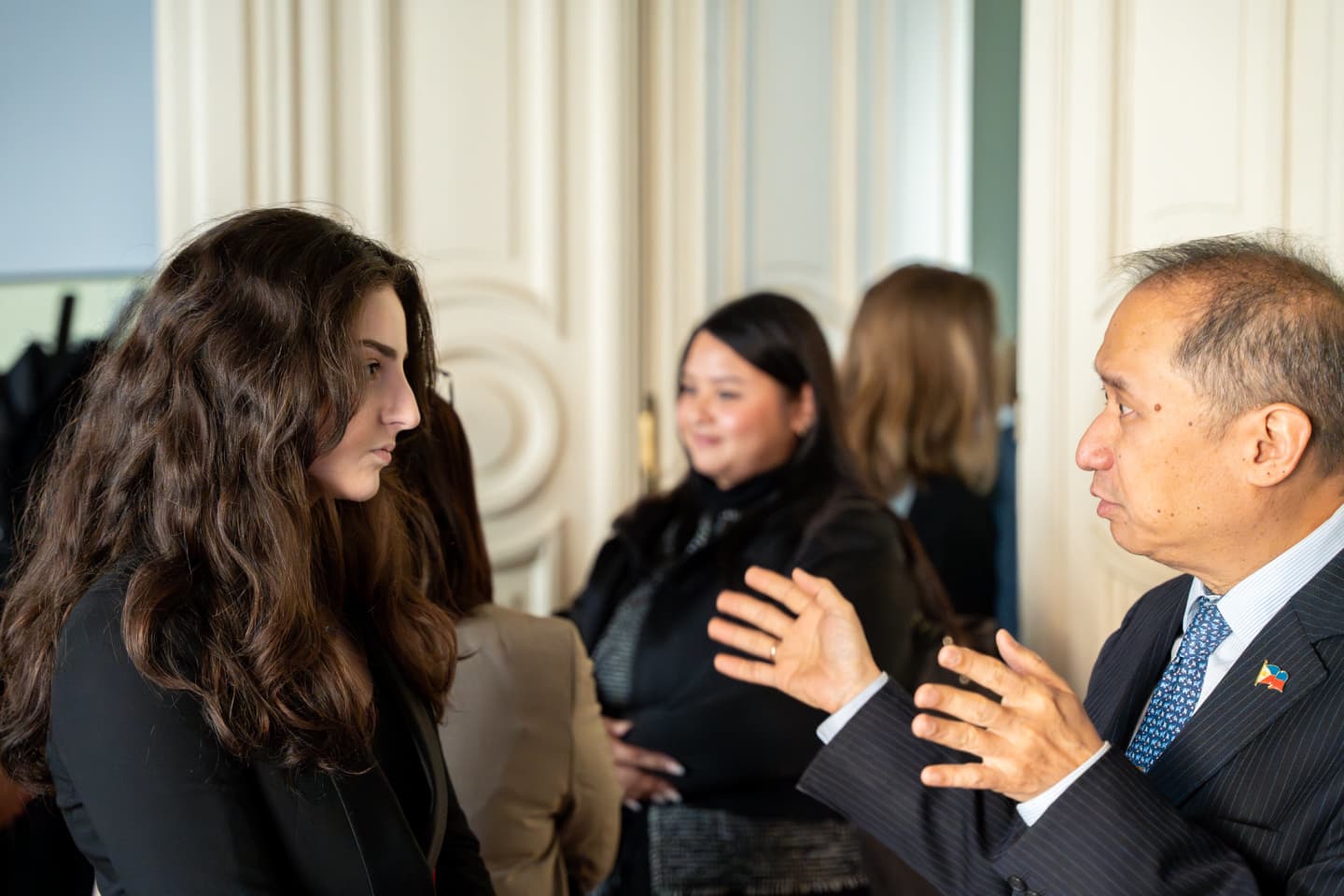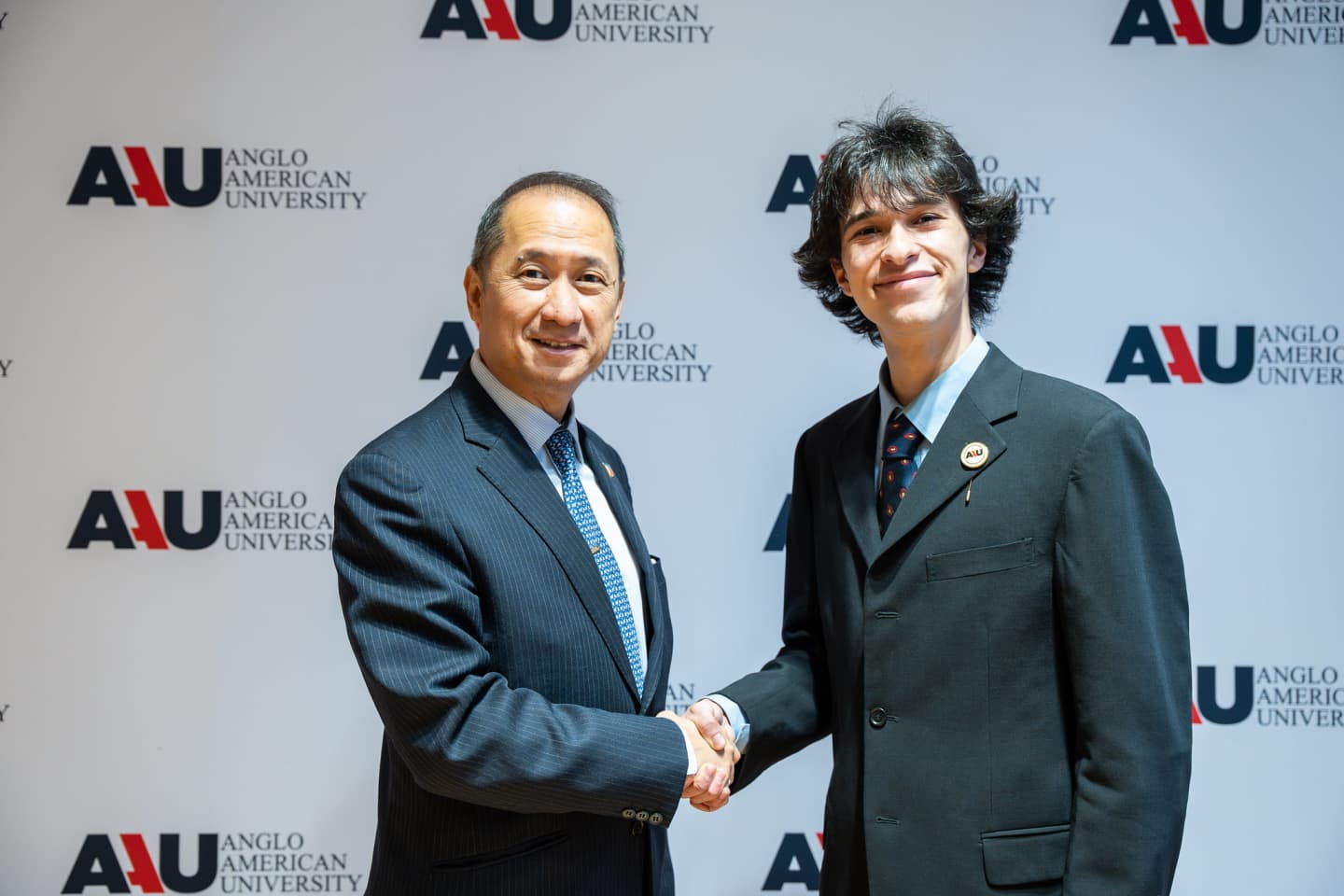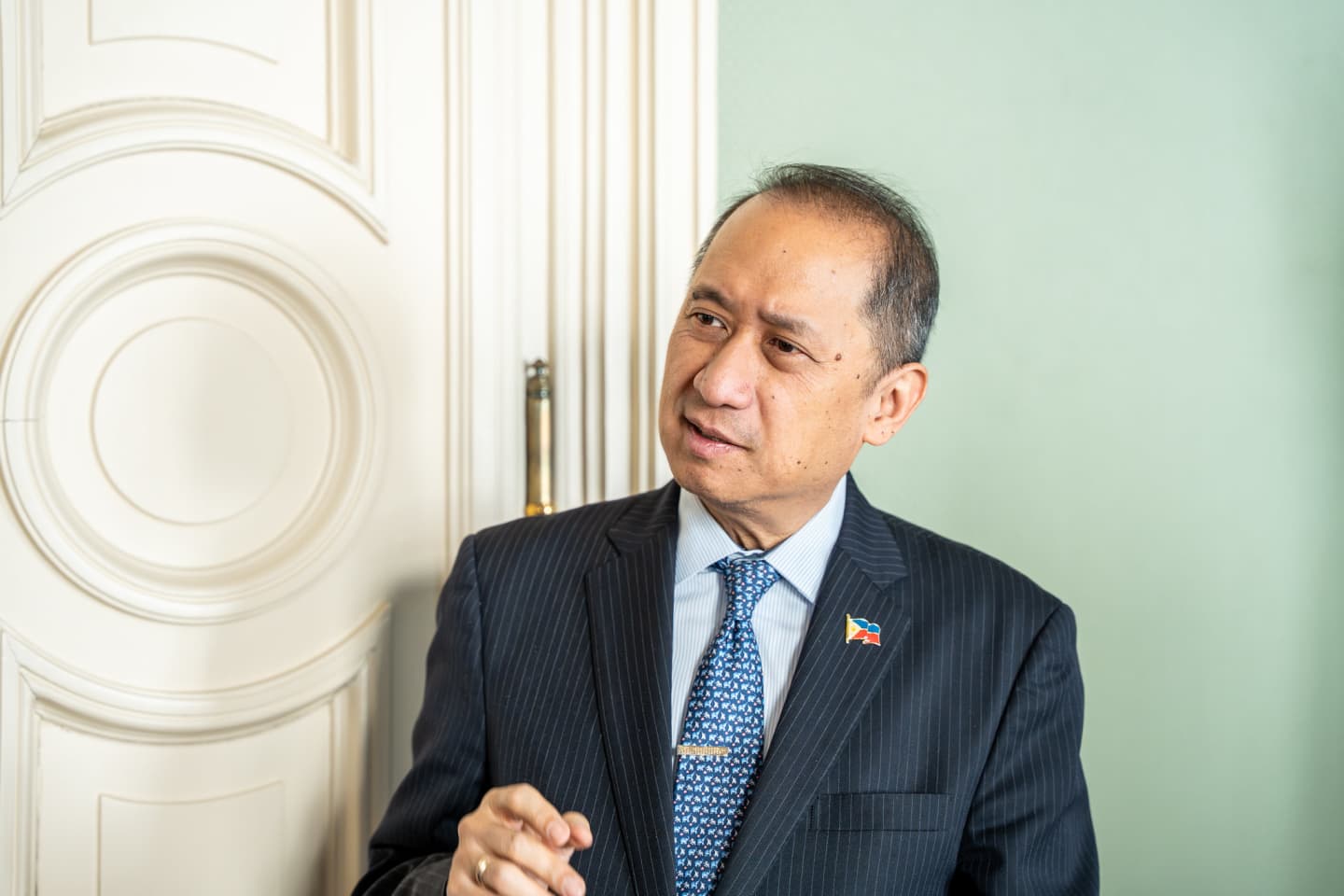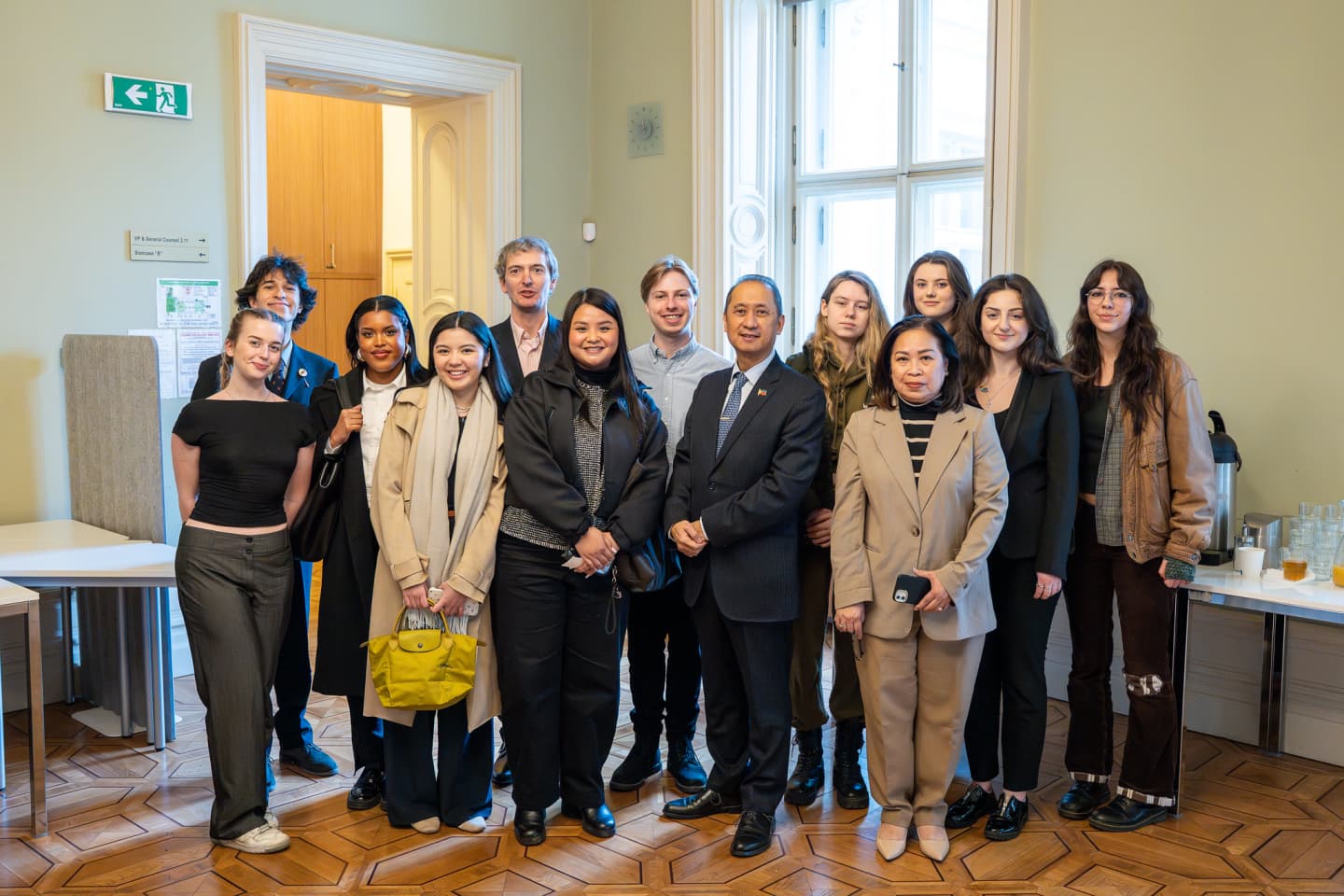From Manila to Prague: Ambassador Eduardo Martin R. Meñez on Global Diplomacy

His Excellency Eduardo Martin R. Meñez, the Philippine Ambassador to the Czech Republic, recently visited Anglo-American University (AAU) to give a talk before the community as part of the university’s regular Meet the Ambassador series. Moderated by Chair of the Department of History and Philosophy Gerald Power, Ph.D. of the School of Arts, Humanities, and Social Sciences, the event provided students with yet another unique opportunity to interact directly with an ambassador of note and benefit from his extensive wisdom and firsthand experience.
A seasoned diplomat with over three decades of experience, Meñez joined the Philippine Department of Foreign Affairs in 1991. Over the years, he served in various diplomatic capacities, including postings in the Netherlands, the Philippine Mission to the United Nations in New York, Iran, and Japan. He also held other key positions in the Philippine government, such as assistant secretary of the Office of Public and Cultural Diplomacy and the Office of the United Nations and Other International Organizations. His contributions to Philippine participation in UN peace operations earned him the National Council for United Nations Peace Operations (NCUNPO) Award in 2014.

A graduate of the University of the Philippines with a degree in Political Science, Meñez furthered his studies in international security policy at the University of Geneva and the Geneva Centre for Security Policy. His extensive career, coupled with his personal connection to diplomacy as the son of a foreign service officer, has positioned him as a knowledgeable and seasoned representative of the Philippines on the global stage.
During his speech, Meñez offered insights into the evolving relationship between the Philippines and the Czech Republic, diplomatic careers, and broader international relations. He highlighted the history of diplomatic relations between the two nations, which formally began on October 5, 1973, at which time the Philippines was making a notable shift by establishing ties with Eastern European countries, despite its historical alignment with Western democracies.
Meñez noted that initial engagement between the Philippines and Czechoslovakia remained limited until the Czech Republic’s transition to democracy. This shift was marked by high-level exchanges, such as President Václav Havel’s 1995 visit to the Philippines and President Fidel Ramos’s visit to the Czech Republic in 1997, coinciding with the opening of the Philippine Embassy in Prague. Meñez, who was involved in organizing Ramos’s visit as a young diplomat, reflected on the significance of these early interactions in shaping modern bilateral ties.

Since his arrival in Prague, he said he has witnessed an increase in high-level engagements between the two nations, characterizing this period as a “golden age” of Philippine-Czech relations. In recent years, both countries have strengthened their connections through official visits from leaders, including the Czech prime minister, the speaker of the Czech Chamber of Deputies, and various ministers covering trade, foreign affairs, and defense. Philippine President Ferdinand Marcos Jr. also conducted a state visit to Prague, further solidifying these ties.
Meñez also addressed the growing Filipino community in the Czech Republic, tracing the rise in migration since 1997. Initially numbering just a few dozen individuals, the Filipino population has expanded significantly due to Czech labor migration programs. At the close of 2024, approximately 10,400 resided in the country, with the number expected to increase due to expanded labor agreements. He noted that Filipinos are often sought after by Czech employers for their adaptability and work ethic, particularly in sectors facing labor shortages. Additionally, he acknowledged the cultural contributions of the Filipino community, such as their active participation in Catholic churches across the country.
The ambassador further discussed the broader geopolitical landscape, emphasizing the Philippines’ strategic position in the Indo-Pacific and its ongoing security concerns, particularly in relation to China’s territorial claims in the South China Sea. He outlined the Philippines’ legal victory in the 2016 Permanent Court of Arbitration ruling, which invalidated China’s expansive maritime claims, though acknowledged that enforcement remains a challenge. Comparing the situation to European territorial disputes, he illustrated the complexities of international law and the difficulties smaller nations face in upholding legal rulings against major powers.

Regarding military alliances, Meñez elaborated on the Philippines’ defense agreements, particularly its long-standing security partnership with the United States. The two nations maintain a mutual defense treaty, similar in structure to NATO’s collective security framework. He also discussed the Philippines’ involvement in regional security initiatives alongside the U.S. and Japan, as well as its participation in dialogues such as the Munich Security Conference.
Sharing insights into his career, Meñez provided practical advice for students aspiring to enter diplomacy, explaining that in the Philippines, joining the foreign service requires passing a rigorous examination, a process similar to that of the U.S. State Department. He emphasized the importance of multilingualism, adaptability, and a strong public service mindset in diplomatic work. Looking back on his own experience, he underscored the value of both bilateral and multilateral diplomacy in shaping global relations.
Reflecting on the event, Chairman Power noted that:
“His Excellency… gave a really impressive presentation to the AAU community. He managed to speak on a diverse range of themes… [and] the audience came away with a vivid sense that here was a diplomat who is making a genuine difference… He and his colleague from the embassy definitely impressed the audience with their friendliness and enthusiasm for representing their country.”
Through his address, Meñez provided students and faculty with a nuanced perspective on contemporary diplomacy, emphasizing the importance of historical context, legal frameworks, and international cooperation in addressing global challenges, while reinforcing the role of diplomacy not only in state-to-state relations but also in fostering cultural and economic exchanges that benefit both nations.

More photos from the event can be found here.